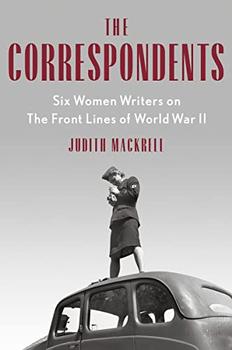Summary | Excerpt | Reviews | Beyond the Book | Readalikes | Genres & Themes | Author Bio

Critics' Opinion:
Readers' Opinion:
First Published:
Nov 2021, 464 pages
Paperback:
Feb 2023, 480 pages
 Book Reviewed by:
Book Reviewed by:
Kim Kovacs
Buy This Book
Chapter One
Berlin, 1936
"I want to give readers all the dope there is" - Sigrid Schultz
In the autumn of 1936, Sigrid Schultz was starting to feel like a stranger in her own city. Less than a decade ago, the Berlin she'd known and loved had been crackling with wit, colour, deviance and dissent. Painted boys with nipped-in waists had sauntered through the stylish crowds along Kurfürstendamm; girls in suits and monocles had drunk cocktails at the Eldorado ballroom. Satire—the city's native genius—had flourished in cabarets and bars, and, as a very dazzled young William Shirer had noted, Weimar Berlin had felt like "a wild open city full of crazy poets and homosexuals," a place for adventure and self-reinvention.2 It had been a city of violence, too—scarred by Germany's recent defeat in the 1914–18 war, rocked by political battles within the newly democratic Reichstag and growling with a savage underbelly of poverty, drugs and prostitution. Yet, to an ambitious young journalist like Sigrid, it was the darkness in the glitter of Berlin that made it the most engrossing city in the world in which to make her career.
Then, in 1933, Hitler and the National Socialists had seized power, and the Nazification of Berlin began. The brown-shirted muscle of the Sturmabteilung (SA) and the black-uniformed elite of the Schutzstaffel (SS) had bullied most of the satirists into silence and forced the radical artists to skip town. Formerly emancipated women had been told to wipe off their lipstick and produce babies for the Fatherland, while the children were dragooned into the Hitler Youth or the League of German Girls. As fledgling Nazis paraded through Berlin in their crisp little shirts and neckerchiefs, it seemed to Sigrid as though the city itself was in uniform. Scarlet and black swastikas rippled from every public building and the streets were loud with Party messages, broadcast daily over public loudspeakers.
The harsh metallic tones of Adolf Hitler and the hectoring bark of his Propaganda Minister Joseph Goebbels had become almost as familiar to Berliners as the voices of their family and friends. And, to all those who'd become principal targets of the regime—the trade unionists, the communists, the homosexuals and, above all, the city's Jews—these voices were also a daily reminder of the threats they faced, whether of violence or arrest.
As bureau chief of the Chicago Tribune, Sigrid had made it her mission to keep America informed about Germany's decline into totalitarianism, to expose every stage of its draconian dismantling of democracy and the rule of law. According to Gregor Ziemer, her former assistant and fellow journalist, she was "one of the most talented foreign correspondents" of her generation, publishing more damning information about the Nazis than any of her colleagues, facing off Gestapo spies and interrogation until she was finally forced to leave.3 Hitler's Berlin had been her personal war zone, and if it had made her as expert as any combat journalist in arming herself against danger, it had also forced her to keep very close the fact that, by Nazi reckoning, she was a Jew.
Sigrid Lilian Schultz had settled in Berlin late in 1913. She'd been a pretty, intellectually pugnacious twenty-one-year-old, with a command of several foreign languages and a headful of ambitions to sing in opera or practise law. She also considered herself a cosmopolitan, for, despite her Germanic-sounding name, her father had been born in Norway and she herself had been born in Chicago, where Herman Schultz, a society portrait painter, had moved in 1891 to advance his career. His plan had been to put down "deep roots in prairie soil" to create his version of the American dream, and, after his eighteen-year-old wife, Hedwig, had given birth to Sigrid, on 5 January 1893, he'd settled his family in a spacious house in the suburb of Summerdale, with a garden overlooking miles of open ground.4
Excerpted from The Correspondents by Judith Mackrell. Copyright © 2021 by Judith Mackrell. All rights reserved. No part of this excerpt may be reproduced or reprinted without permission in writing from the publisher.





The House on Biscayne Bay
by Chanel Cleeton
As death stalks a gothic mansion in Miami, the lives of two women intertwine as the past and present collide.

The Flower Sisters
by Michelle Collins Anderson
From the new Fannie Flagg of the Ozarks, a richly-woven story of family, forgiveness, and reinvention.

The Funeral Cryer by Wenyan Lu
Debut novelist Wenyan Lu brings us this witty yet profound story about one woman's midlife reawakening in contemporary rural China.
Your guide toexceptional books
BookBrowse seeks out and recommends the best in contemporary fiction and nonfiction—books that not only engage and entertain but also deepen our understanding of ourselves and the world around us.